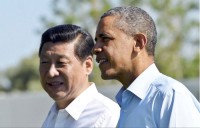
Minxin Pei, Tom and Margot Pritzker ’72 Professor of Government , Claremont McKenna College
Sep 04, 2015
Many China watchers believe that the ties between Beijing and Washington are at their lowest level since Tian’anment. President Xi can nevertheless reassure the American political establishment that he is leading China in the right direction, and not trying to turn it into another version of the former Soviet Union.
Ben Reynolds, Writer and Foreign Policy Analyst in New York
Sep 01, 2015
When playing up the mutually beneficial aspects of economic cooperation between the U.S. and China, many theorists often ignore the competitive and destabilizing elements introduced by structural economic concerns. The struggle for emerging markets and untapped resources is adversarial, and it may intensify as economic growth slows.
He Yafei, Former Vice Minister of Foreign Affairs
Sep 01, 2015
Chinese and Americans should not be surprised by our divergent approaches to both bilateral and global issues. The key to success is to seek common ground while tolerating differences in a partnership committed to peace and a new world order. Sometimes we ought to stand in the other’s shoes and take a more balanced view of the issues we both face.
George Koo, Retired International Business Consultant and Contributor to Asia Times
Aug 28, 2015
For most of his administration, Obama’s foreign policy followed the disastrous course left by his predecessor combined with his desire to offend the least number of his Congressional critics. George Koo provides four suggestions for Obama to make a positive course correction.
Qin Xiaoying, Research Scholar, China Foundation For Int'l and Strategic Studies
Aug 27, 2015
Indecisive western responses to China’s military parade invitation are based ultimately on their profound worries about the potential impacts that China’s development will exert on the political and economic patterns of the present-day world.
Cui Tiankai, China’s ambassador to the United States
Aug 27, 2015
Even on controversial issues, cooperation—instead of confrontation—is key to finding solutions.
Chen Jimin, Guest Researcher, Center for Peace and Development Studies, China Association for International Friendly Contact
Aug 25, 2015
Only when people with vision in Japan take positive actions, and the entire international community successfully urge Japan to adopt a correct reading of history, will Japan’s relations with its East Asian neighbors be able to move forward into an era of mutual trust and respect.
Doug Bandow, Senior Fellow, Cato Institute
Aug 24, 2015
In Chinese academic and policy circles, emotional attachment to North Korea is steadily draining away, which creates an opportunity for Washington to persuade the PRC to change its policy toward the nation.
Li Shaoxian, President, China Institute for The Study of Arabian Countries, Ningxia University
Aug 24, 2015
The Iranian nuclear deal, formally known as the Joint Cooperation Plan of Action, is attributable to foreign policy adjustments by both the US and Iran, and the decision to meet each other half way.
Tom Watkins, President and CEO of the Economic Council of Palm Beach County, FL
Aug 21, 2015
President Xi Jinping will visit the United States in September, partaking in a high stakes, scripted, state dinner with President Obama and other dignitaries at the White House. The Chinese leader will be in the neighborhood for the celebration of the 70th anniversary of the United Nations.
Back to Top

- China-US Focus builds trust and understanding between the U.S. and China through open dialogue among thought leaders.
- Our Offerings
- Topics
- Videos
- Podcasts
- Columnists
- Research Reports
- Focus Digest
- Stay Connected
-
Thanks for signing up!
- Get the latest stories from China-US Focus weekly.